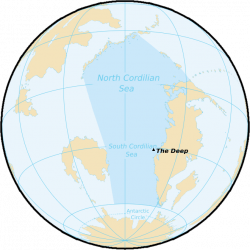Cordilian Sea (Pacifica): Difference between revisions
m (Added Viliakmon's coastal city) |
No edit summary Tag: 2017 source edit |
||
| Line 35: | Line 35: | ||
The Gulf of Good Omen joins the Cordilian Sea, the Transcrabrian Sea and the South Pacific Ocean to the east, the Frost Sea links the Cordilian Sea with the North Pacific Ocean on the north. To the south, the Cordilian Sea connects directly to the Antartic Ocean at latitude 60°S. | The Gulf of Good Omen joins the Cordilian Sea, the Transcrabrian Sea and the South Pacific Ocean to the east, the Frost Sea links the Cordilian Sea with the North Pacific Ocean on the north. To the south, the Cordilian Sea connects directly to the Antartic Ocean at latitude 60°S. | ||
=== Bordering nations === | |||
{{div col|colwidth=20em}} | |||
* {{flag|Bruuma}} | |||
* {{flag|Frost Empire}} | |||
* {{flag|GI-Land}} | |||
* {{flag|Holy Free}} | |||
* {{flag|Hystaiga}} | |||
* {{flag|Kosbareland}} | |||
* {{flag|Ryccia}} | |||
* {{flag|Snolland}} | |||
* {{flag|Techganet}} | |||
* {{flag|Tekarai}} | |||
* {{flag|UPRAN}} | |||
* {{flag|Valora}} | |||
* {{flag|Viliakmon}} | |||
{{div col end}} | |||
Revision as of 12:58, 8 August 2022
| Cordilian Sea | |
|---|---|
 | |
| Surface area | 30,630,000 km2 (11,830,000 sq mi) |
| Average depth | 3,260 m (10,700 ft) |
| Max. depth | 6,540 m (21,460 ft) |
| Water volume | 200,320,200 km3 (48,059,400 cu mi) |
| Islands | List of islands |
| Settlements |
|
The Cordilian Sea stretches from the North Pacific Ocean in the north to the Southern Ocean in the south, and washes the shores of Cordilia to the east and the island continent to the west.
It encompasses 30,630,000 km2 (11,830,000 sq mi) in area, and covers about 6% of the total area of Pacifica. The Cordilian Sea splits into two regions with different and independent ocean currents at the equator due to the Coriolis Effect, the North Cordilian Sea and the South Cordilian Sea, this last one taking most of the area of the Cordilian Sea and being the main current in the occidental shore of Cordilia.
Its average depth is around of 3,300 m (10,800 ft). The Deep in the Cordilian Trench, located west of Kosbareland, is the deepest point of the Cordilian Sea.
The Cordilian Sea has some marginal seas within it, including but not limited to the Sea of Frost, the Serevan Sea and the Astro Sea.
Etymology
Since ancient times, the Cordilian Sea has been navigated by diverse civilizations from all places. The name of Cordilian Sea was coined due to being the major sea at the west coasts of the Cordilia continent.
Geography
The Cordilian Sea separates Cordilia from the West Pacific. It may be further subdivided by the equator into northern (North Cordilian) and southern (South Cordilian) portions. It extends from the Antarctic region in the South to the North Pacific Ocean in the north. The Cordilian Sea encompasses approximately 6% of Pacifica's surface, having an area of 30,630,000 km2 (11,830,000 sq mi)— larger than Cordilia itself.
Extending approximately 9,615 km (5,974 mi) from the West Pacific Island Chain in the north to the northern extent of the circumpolar Southern Ocean at 60°S, the Pacific reaches its greatest east–west width at about 3.5°N latitude, where it stretches approximately 5,075 km (3,153 mi) from the West Pacific Island Chain to the coast of Rock Island, TSSS. Its geographic center is at 15°S 55.5°W. The lowest known point on the Cordilian Sea—The Deep—lies 6,540 m (21,460 ft; 3,580 fathoms) below sea level. Its average depth is 3,260 m (10,700 ft; 1,780 fathoms), putting the total water volume at roughly 200,320,200 km3 (48,059,400 cu mi).
The Gulf of Good Omen joins the Cordilian Sea, the Transcrabrian Sea and the South Pacific Ocean to the east, the Frost Sea links the Cordilian Sea with the North Pacific Ocean on the north. To the south, the Cordilian Sea connects directly to the Antartic Ocean at latitude 60°S.